
Gravity holds everything in place. It keeps you from floating away, holds the oceans down, and keeps the Moon in orbit.
But what if it just… disappeared for one second?
And sure, one second may sound like nothing, but in the world of physics, it could mean disaster. That tiny moment could lead to huge damage.
So…let’s walk through what would happen. Starting with the basics.
What Is Gravity?
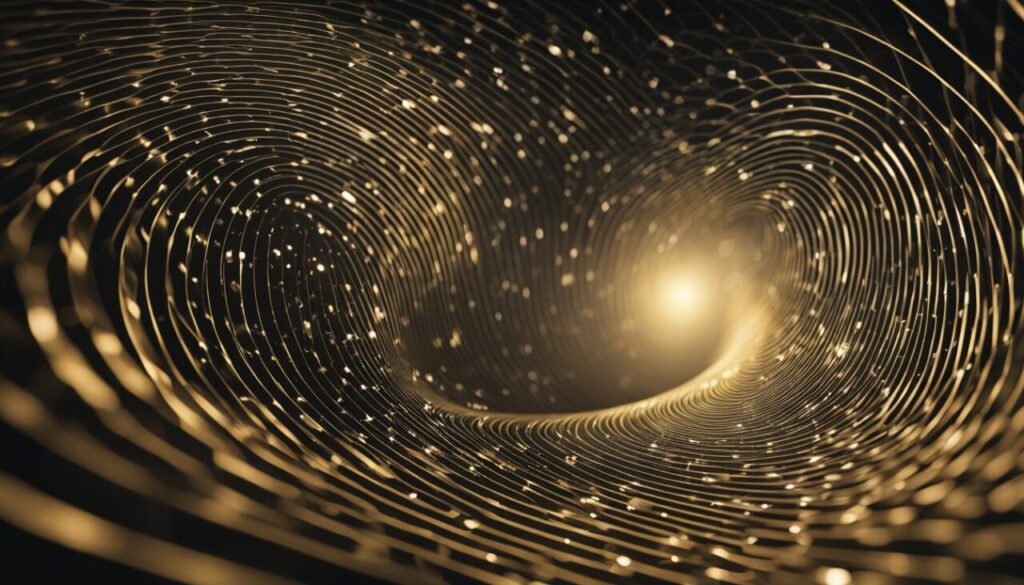
Gravity is the invisible force that pulls things toward each other. On Earth, it’s what keeps us, buildings, oceans, and the air grounded. It gives us weight and shape, keeping everything organized and predictable.
The reason a ball falls when you drop it? That’s gravity pulling it toward Earth’s center. Without it, there would be no balance or stability in our world.
Simply stated, life as we know it wouldn’t work. At all.
Namely, gravity doesn’t just work on Earth. It holds the Moon in orbit and keeps planets circling the Sun. It also shapes galaxies and stars across space.
Without gravity, everything would float off into the void. It’s weak compared to other forces like magnetism, but it’s the only one that works over long distances and huge masses.
Without it, large-scale structures in the universe would fall apart—or never form at all.
📌 Interesting fact: The Moon’s orbit is the result of a perfect balance between its speed and Earth’s gravity.
📘 Recommended Book: A Brief History of Time by Stephen Hawking — A simple, mind-opening explanation of gravity, time, and the universe.
What If Gravity Stopped Everywhere?
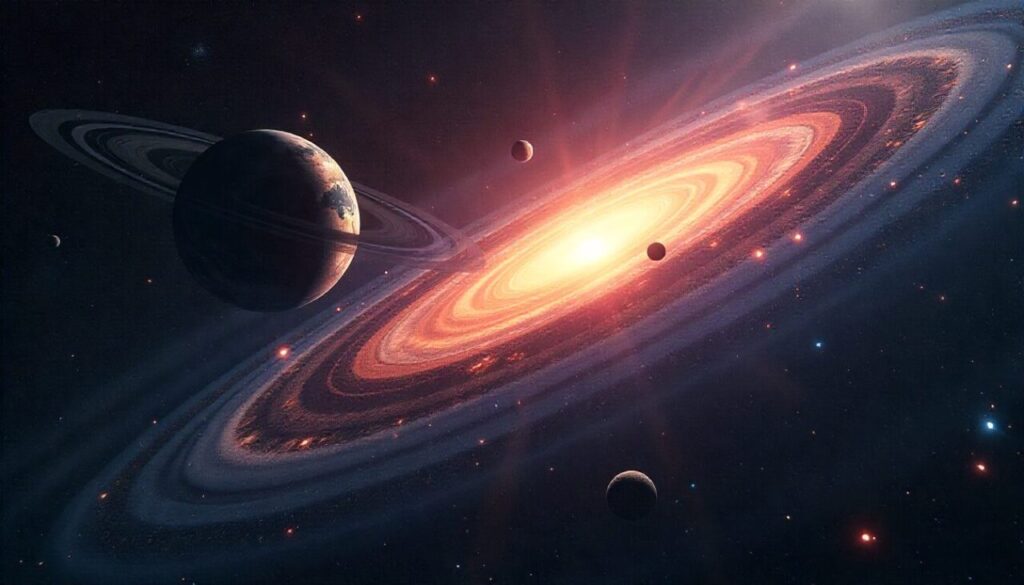
If gravity stopped in the entire universe for one second, everything would move in a straight line. Right now, gravity pulls things into curved paths. That’s why the Earth orbits the Sun, and why the Moon orbits the Earth.
Without that pull, every object would fly off in the direction it was already moving. Planets would drift. Stars would lose their pull on surrounding bodies. Galaxies could tear apart. A lot could go wrong in that single second.
This one-second pause wouldn’t just be a quick break. Even after gravity turned back on, it wouldn’t be able to fix everything. The damage would already be done. Many things would be on paths that don’t bring them back.
The Sun might still hold on to some planets, but others could be flung far into space. Earth could end up freezing in the dark or burning too close to a new star.
That one second would change the path of everything forever.
📌 Interesting fact: Earth orbits the Sun at 30 km per second, enough to travel over 25,000 kilometers in just one second.
📘 Recommended Book: Astrophysics for People in a Hurry by Neil deGrasse Tyson — Quick, engaging bites of space science and the forces that shape it.
What If Gravity Stopped Only on Earth?
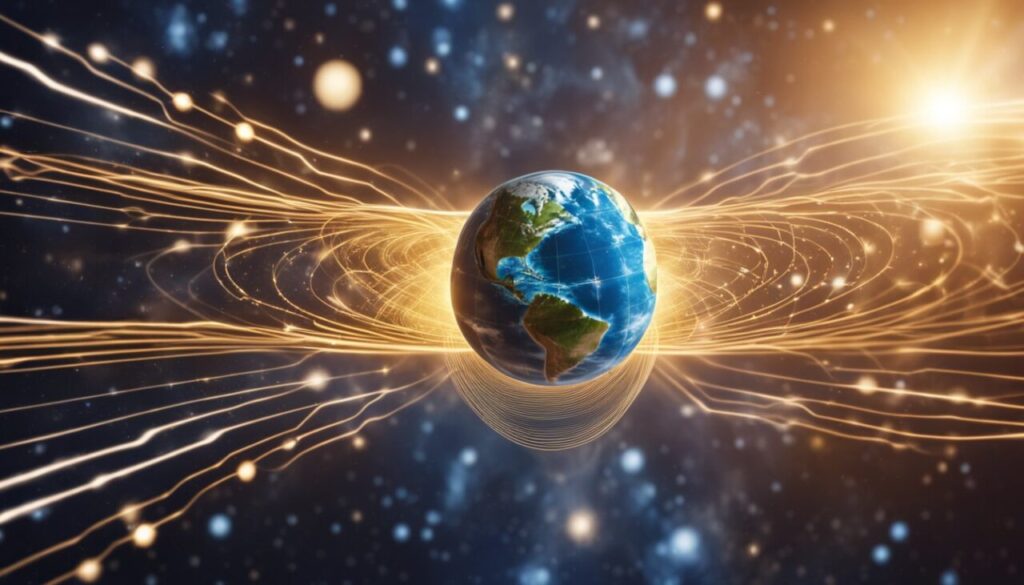
Now, let’s say gravity stops only on Earth for one second. That would still be a nightmare. Anything not tightly fixed would lift off the ground—people, water, air, dust, loose objects.
It would look like a magic trick gone wrong. One second may not be long, but during that time, everything would start to float. And when gravity comes back, everything falls, fast and hard.
Air would shoot upward. Water from lakes and oceans would rise. Dust and debris would fill the air. People could slam into ceilings, trees, or even power lines.
Then they’d fall. The crash from the sudden return of gravity would cause broken bones, destroyed homes, and serious chaos. The world would look like it just went through a war—all in just one second.
📌 Interesting fact: Gravity is what holds Earth’s air in place. Without it, we’d lose our atmosphere fast.
📘 Recommended Book: The Science of Interstellar by Kip Thorne — Learn how forces like gravity shape space and time, including real science behind sci-fi.
What Happens to People?
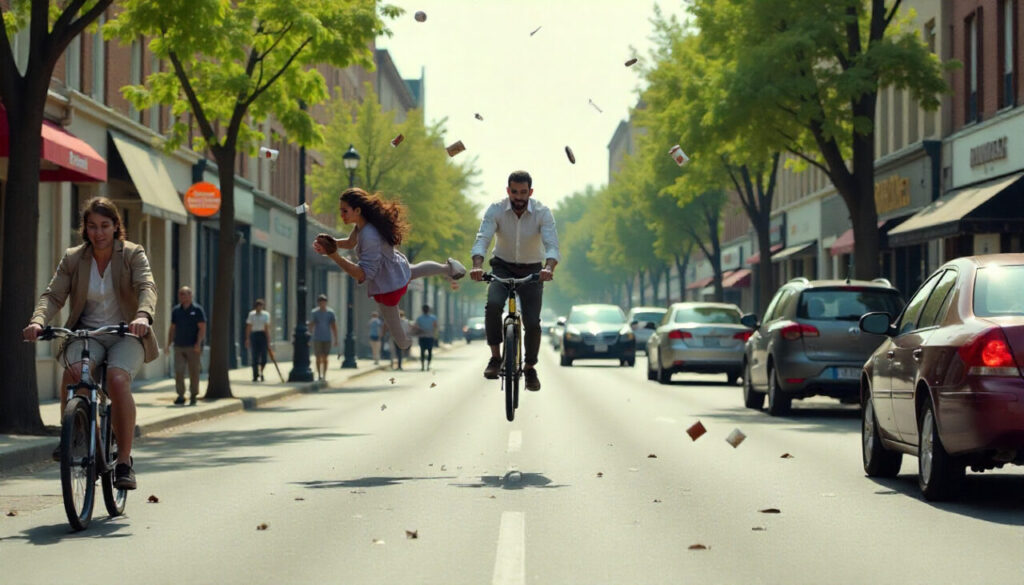
If you were standing up when gravity stopped, you’d float. Not into space—but maybe a few feet up. You’d rise based on how fast your body was moving at the time.
If you were walking or running, you’d float at an angle. Some people might flip, others might drift sideways. It wouldn’t be graceful like in space movies. It would be sudden, messy, and scary.
Your feet and head wouldn’t move together. So, you might twist mid-air. People indoors could hit ceilings or crash into shelves. Outside, you could float upward and then slam down on the pavement or rocks.
Even falling from two meters could hurt. Cars might rise a bit, and people inside could bounce around. Hospitals would be overwhelmed with injuries. It would feel like the worst rollercoaster ride—only much more dangerous.
📌 Interesting fact: Most injuries from falling happen at home, not from great heights.
📘 Recommended Book: Packing for Mars by Mary Roach — A funny, smart look at how humans react to zero gravity and other space conditions.
What Happens to Air and Water?

Air doesn’t just stay around Earth on its own. It’s held down by gravity. The same goes for water in oceans, lakes, and rivers.
Without gravity, all of that would fly upward. You wouldn’t be able to breathe because the air around you would rise. Even if it came back one second later, the shift could create violent winds and shockwaves when it returned.
Water would leap into the air like a huge splash. Waves would fly upward. Raindrops in clouds would scatter. Rivers might reverse for a moment. Clouds would thin out or drift into space.
Planes flying in the sky would lose lift. Fish in shallow water might be thrown into the air. When gravity snapped back, the mess would fall. Think of it as a global-scale water bomb—and no one would be ready.
📌 Interesting fact: A single liter of water weighs about 1 kilogram, and Earth has over 1.3 billion trillion liters of it.
📘 Recommended Book: The Hidden Life of Water by Masaru Emoto — A unique look into how water reacts to the environment around it, including physical and invisible forces.
What Happens to Buildings and Roads?
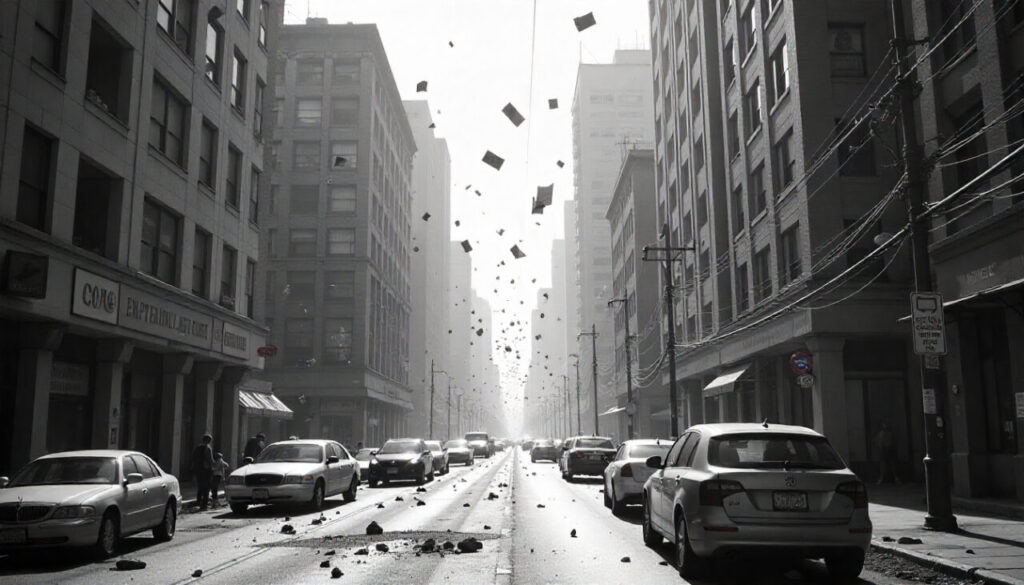
Tall buildings are heavy, but some parts are not fixed in place. Roof tiles, signs, windows, and antennas could all lift. If gravity stopped, even for one second, loose materials would go flying.
Bricks, tools, and debris could become deadly. And when gravity returns, everything falls. Some parts of buildings might not survive that crash.
Roads and cars would also suffer. Vehicles could lift slightly, losing their grip. When they come back down, tires could burst, and frames might bend.
Power lines and poles could fall. Bridges could shift or collapse.
📌 Interesting fact: A single brick, if dropped from 2 stories, can hit with enough force to crack a skull.
📘 Recommended Book: Why Buildings Fall Down by Matthys Levy and Mario Salvadori — Real stories of building failure, and how physics plays a role.
What About the Ocean?
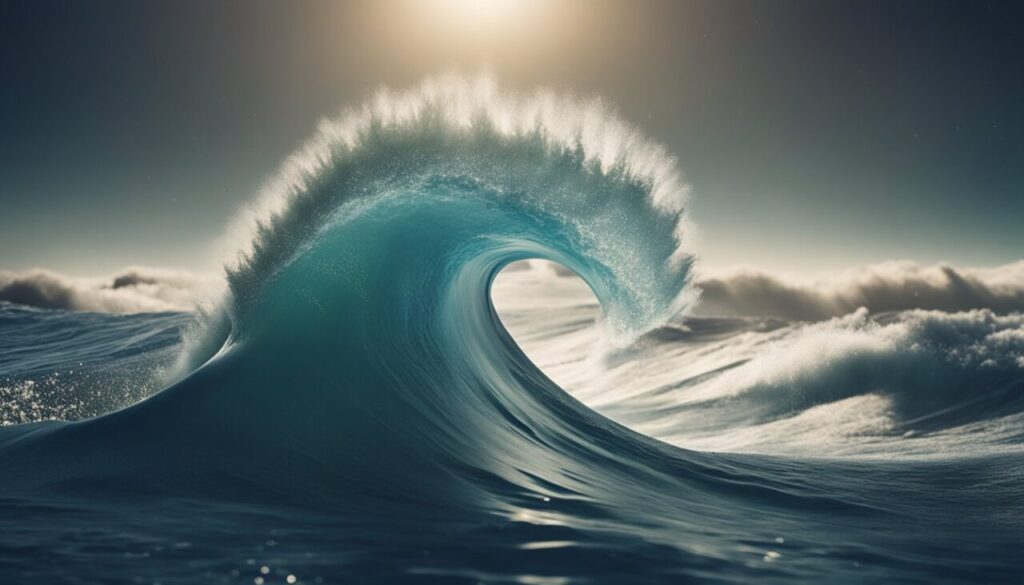
The ocean holds 97% of Earth’s water. If gravity stopped, even for one second, all that water would shift upward. Waves wouldn’t stay in place. They would shoot up, then crash back down with massive force.
Coastlines would be flooded. Islands could be hit hard. Ships would get tossed around. Underwater animals would be thrown into chaos.
Submarines might lose control, and floating docks would rise and slam down. Water pipes and systems near the surface might burst.
The water wouldn’t come back gently—it would slam like a tidal wave. That single second could cause damage equal to a major tsunami.
📌 Interesting fact: A tsunami can travel across the entire ocean in under 24 hours.
What Happens to Animals?

Animals would be scared. They don’t understand physics, but they do sense sudden change. Birds in the sky could lose flight and tumble. Cats, dogs, and livestock would float for a moment and then crash.
Wild animals could get stuck in trees or fall from cliffs. Zoos and farms would be chaotic.
Some animals might not survive. Others would run or hide in panic. Fish could be tossed from shallow water. Even insects would get disoriented. The return of gravity could pin animals under debris or hurt them as they land.
📌 Interesting fact: Birds need gravity to fly—they push against air held down by gravity.
What Happens to Satellites?
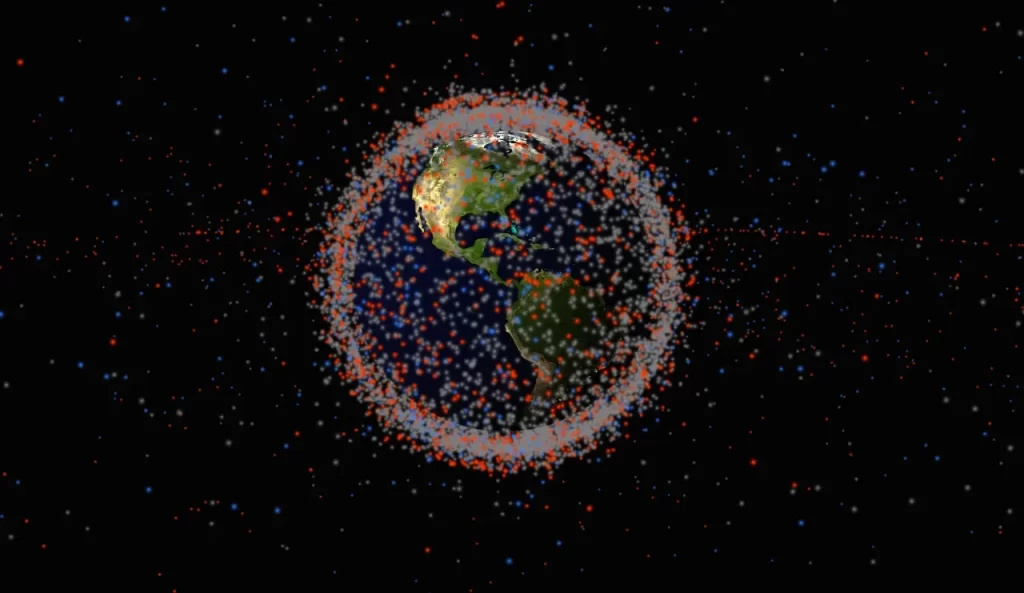
Satellites depend on gravity to stay in orbit. They’re not just floating up there—they’re falling, all the time, just sideways fast enough to miss Earth.
So, if gravity stopped for even one second, that balance would break. Satellites would move in straight lines instead of curved paths. Some might move off course forever. Others could fall toward Earth or drift into space.
Even one second could change everything. GPS satellites might lose accuracy or break down. Weather satellites could stop tracking storms.
Communications could fail. Some satellites might be recovered, but others would be lost. It would take months to rebuild what was lost in that single second. Whole systems we rely on—like the internet, phones, and maps—would be offline or broken.
📌 Interesting fact: GPS satellites must adjust for both gravity and time to work correctly on Earth.
📘 Recommended Book: Satellite Basics for Everyone by C. Robert Welti — A plain-English guide to how satellites orbit, stay in place and keep us connected.
Would We Survive?

The short answer is yes—most people would survive. But that doesn’t mean we’d walk away unharmed. The real danger would come from the chaos: crashing vehicles, falling buildings, flying objects, and sudden impacts.
People could die in accidents or from falling. Many would be hurt. Others might be trapped or stranded without help for hours.
Hospitals would fill quickly. Roads might be blocked. Fires could break out from broken power lines. If it happened at night, it would be even worse—less visibility and slower response. Emergency services would be stretched thin.
And the mental impact would last long after. People would live in fear of it happening again (similar to post-earthquake stress).
That one second would leave a mark on history, and on people’s lives.
📌 Interesting fact: During natural disasters, more people are injured by indirect events (like crashes and falls) than the disaster itself.
Could This Really Happen?
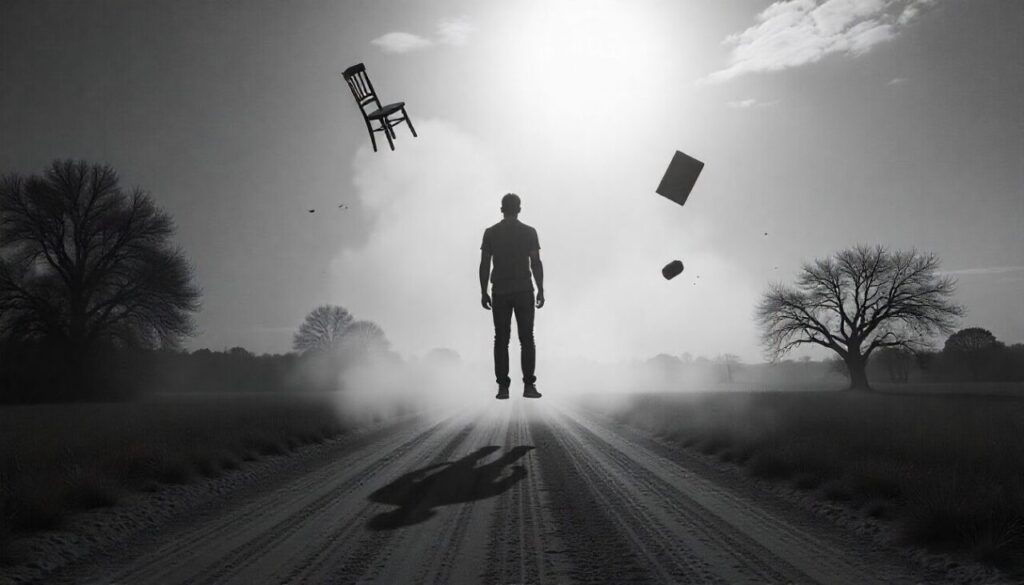
No. Gravity can’t just shut off. It’s not powered by electricity or held together by a switch. It’s built into space itself.
Gravity comes from mass—how much matter something has. The more mass, the stronger its gravity. Earth, the Sun, and even black holes have gravity because they have mass.
To make gravity stop, you’d have to change the laws of physics. That’s not something even the most powerful machines can do.
Interestingly enough, scientists study ways to manipulate gravity, but only in tiny ways, such as slowing light or bending space slightly.
Turning it off completely? Impossible with what we know. This idea is fun to think about—but it belongs in science fiction.
So why even think about this?
Well, thinking about it helps us understand how much we depend on it. Every second, it keeps us alive—by holding down air, water, and our bodies.
We don’t feel it, but it’s always working.
And so, this mental exercise shows how connected everything is. A one-second glitch could undo millions of years of balance.
📌 Interesting fact: Einstein showed that gravity is not a force, but a bend in space-time caused by mass.




























